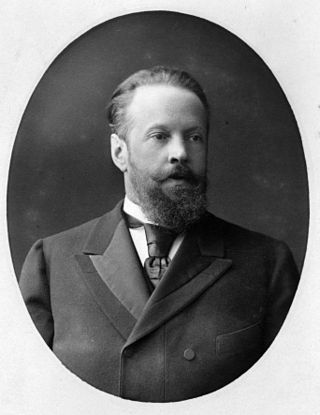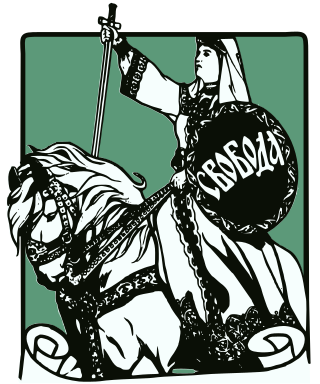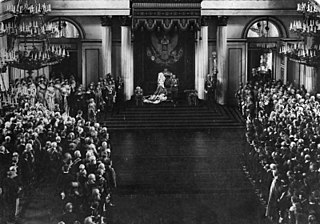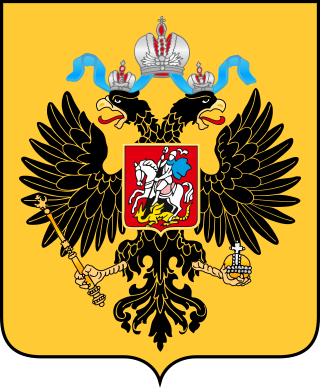A duma is a Russian assembly with advisory or legislative functions.

Count Sergei Yulyevich Witte, also known as Sergius Witte, was a Russian statesman who served as the first prime minister of the Russian Empire, replacing the emperor as head of government. Neither liberal nor conservative, he attracted foreign capital to boost Russia's industrialization. Witte's strategy was to avoid the danger of wars.

Pyotr Arkadyevich Stolypin was a Russian statesman who served as the third prime minister and the interior minister of the Russian Empire from 1906 until his assassination in 1911. Known as the greatest reformer of Russian society and economy, his reforms caused unprecedented growth of the Russian state, which was halted by his assassination.

Ivan Logginovich Goremykin was a Russian politician who served as the prime minister of the Russian Empire in 1906 and again from 1914 to 1916, during World War I. He was the last person to have the civil rank of Active Privy Councillor, 1st class. During his time in government, Goremykin pursued conservative policies.

The Chairman of the Government of the Russian Federation, also informally known as the prime minister, is the head of government of Russia and the second highest ranking political office in Russia. Although the post dates back to 1905, its current form was established on 12 December 1993 following the introduction of a new constitution.

Pavel Nikolayevich Milyukov was a Russian historian and liberal politician. Milyukov was the founder, leader, and the most prominent member of the Constitutional Democratic party. He changed his view on the monarchy between 1905 and 1917. In the Russian Provisional Government, he served as Foreign Minister, working to prevent Russia's exit from the First World War.

The Constitutional Democratic Party, also called Constitutional Democrats and formally the Party of People's Freedom, was a political party in the Russian Empire that promoted Western constitutional monarchy—among other policies—and attracted a base ranging from moderate conservatives to mild socialists. Party members were called Kadets from the abbreviation K-D of the party name. Konstantin Kavelin's and Boris Chicherin's writings formed the theoretical basis of the party's platform. Historian Pavel Miliukov was the party's leader throughout its existence.

Baron Boris Vladimirovich Shturmer was a Russian lawyer, a Master of Ceremonies at the Russian Court, and a district governor. He became a member of the Russian Assembly and served as prime minister in 1916. A confidant of the Empress Alexandra, under his administration the country suffered drastic inflation and a transportation breakdown, which led to severe food shortages. Stürmer simply let matters drift until he was able to be relieved of this post. He was during the course of his career Minister of Internal Affairs and Foreign Minister of the Russian Empire.

Alexander Fyodorovich Trepov was the Prime Minister of the Russian Empire from 23 November 1916 until 9 January 1917. He was conservative, a monarchist, a member of the Russian Assembly, and an advocate of moderate reforms opposed to the influence of Grigori Rasputin.
The Russian Council of Ministers is an executive governmental council that brings together the principal officers of the Executive Branch of the Russian government. This includes the chairman of the government and ministers of federal government departments.

The State Duma, also known as the Imperial Duma, was the lower house of the legislature in the Russian Empire, while the upper house was the State Council. It held its meetings in the Tauride Palace in Saint Petersburg. It convened four times between 27 April 1906 and the collapse of the empire in February 1917. The first and the second dumas were more democratic and represented a greater number of national types than their successors. The third duma was dominated by gentry, landowners, and businessmen. The fourth duma held five sessions; it existed until 2 March 1917, and was formally dissolved on 6 October 1917.

The Progressive Bloc was an alliance of political forces in the Russian Empire and occupied 236 of the 442 seats in the Imperial Duma.

Legislative elections were held in the Russian Empire from 26 March to 20 April 1906. At stake were the 497 seats in the State Duma of the Russian Empire, the legislative assembly. Election for the First State Duma, which only ran from 27 April to 8 July (O.S.) 1906, returned a significant bloc of moderate socialists and two liberal parties which demanded further reforms. For this reason, it is sometimes called the Duma of Public Anger.

The Vyborg Manifesto ; also called the Vyborg Appeal) was a proclamation signed by several Russian politicians, primarily Kadets and Trudoviks) of the dissolved First Duma on 22 July [O.S. 9 July] 1906.
Events from the year 1917 in Russia.

Cabinet of Pyotr Stolypin – composition of the Council of Ministers of the Russian Empire, under the leadership of Pyotr Stolypin, worked from July 21, 1906 to September 18, 1911.

Second Cabinet of Ivan Goremykin – composition of the Council of Ministers of the Russian Empire, under the leadership of Ivan Goremykin, worked from February 12, 1914 to February 2, 1916.
Events from the year 1906 in Russia.

The Council of Ministers of the Russian Empire was the highest executive authority of the Russian Empire, created in a new form by the highest decree of October 19, 1905 for the general "management and unification of the actions of the chief heads of departments on subjects of both legislation and higher state administration". The ministers ceased to be separate officials, responsible to the emperor, each only for their actions and orders.


























